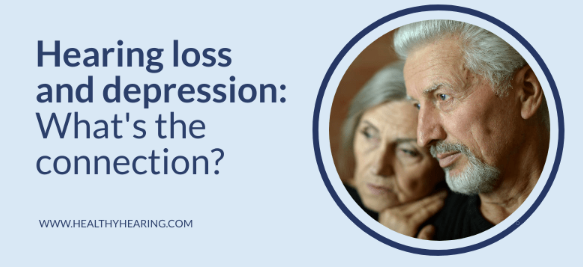|
www.HealthyHearing.com |
The link between depression and untreated hearing lossTreatment options like hearing aids can help
Contributed by Madeleine Burry Key points:
Hearing loss can negatively affect mental health in a variety of ways. When people struggle to hear, communication becomes challenging. This can lead to issues like loneliness, sorrow and social isolation. Audiologist Paul Milner, PhD, CCC-A, owner of Hearing Care Center, sees it in patients all the time. At an appointment, a woman once told him that when she was unable to hear and participate in the festivities for her granddaughter’s birthday, she gave up and went to a bedroom to sit by herself for the rest of the party. “I asked her how it felt to leave because you couldn’t hear, and she said it felt very sad,” Milner says. It’s lonely and upsetting when everyone is having a good time and you can’t participate, he points out. The good news? Hearing aids or other treatments often improve not just the hearing loss, but the depression, too. 
What the research showsIt's well established that people over 65 with hearing loss are more likely to have depression than others of the same age without hearing loss 1. The numbers vary, but the total prevalence of depression among older people with hearing loss is roughly 1 in 52,3. These risks are higher if the hearing loss is severe, or when there is dual sensory impairment, such as vision and hearing loss3. Why is depression more common?Researchers don't know precisely why, but they theorize that it is linked to the struggles with communication and resulting social isolation that can occur. Additionally, some of it may be related to changes in the brain as we get older. Either way, people with hearing loss have greater difficulty following the flow of conversation. Responses that reference the discussion from a few minutes ago can make people appear disoriented. It can also make them feel paranoid, Milner points out. “Even without the most serious hearing loss, people might think others are talking about them because they can’t follow the conversation,” Milner says. Also, frequently asking people to repeat themselves may frustrate others, causing the person to shut down. The good news? Treating hearing loss can benefit mental healthThe good news is that if depression is either due to or exacerbated by hearing loss, treatment could have a positive impact on your mental health. Hearing aids are the most common treatment for most types of hearing loss. 
easier to understand and follow. Along with making it easier to hear, research has shown that hearing aids can improve people’s social, emotional and psychological quality of life. Milner finds that people don’t always recognize the psychological toll hearing loss takes—but once they spend a few weeks getting accustomed to wearing hearing aids, patients often wish they’d been fitted for them sooner. For people with more severe hearing loss, or who have conductive hearing loss, bone-anchored hearing aids or cochlear implants may be recommended instead. All of these devices make it easier to stay connected with others, whether that's casually chatting with your neighbor or spending quality time with your loved ones. Auditory trainingHowever, hearing aids will not help if you don't wear them as much as you shold. This is why the highest benefit is usually seen among people who receive auditory therapy3, which helps people adapt to hearing loss, wearing hearing aids, and communicating more effectively. These efforts can make a big difference: After three months of wearing hearing aids, and six months of auditory training, participants in a small study in Australia had reduced symptoms of depression. And last but not least, receiving behavioral therapy for depression is important, too. For people with hearing loss, therapeutic interventions like Acceptance and Commitment therapy3 may be especially beneficial in processing the emotional impact of losing your hearing, research indicates. How to talk about hearing loss with a loved oneIf you are concerned that a parent or other loved one is exhibiting signs of hearing loss and struggling with depression, you may not be sure how to to start the conversation. “Older people don’t like to be told what to do,” Milner points outs. “It’s a role reversal for them—they used to be in charge of the family, and now the family is trying to tell them what to do.” One thing that can be helpful is to frame the conversation in terms of the benefits that come with treatment. For example, you could mention how hearing aids can make it easier to join in on conversations with friends and family, or how wearing them can reduce their dependency on their partners. It's also helpful to point out that hearing aid technology has improved significantly, making them much more effective, as Milner notes. Bottom lineIt's understandable that untreated hearing loss can take a toll on a person's mental health and increase depression. Grieving the loss of your hearing is normal and understandable. However, there are many steps you can take to help manage these issues. Hearing aids and other treatment options can help you stay socially active, engage with others and allow you be fully present in the moments that matter most. To take the first step towards better health, find a local hearing provider and schedule an appointment today. Sources: 1. Hearing Loss and Depression in Older Adults: A Systematic Review and Meta-analysis, 2019 Madeleine Burry
|
Featured clinics near me
Earzlink Hearing Care - Reynoldsburg
7668 Slate Ridge Blvd
Reynoldsburg, OH 43068

Find a clinic
We have more hearing clinic reviews than any other site!


 Madeleine Burry is a Brooklyn-based freelance writer and editor. She's written about health for several online publications, including Women's Health, Prevention, Health, Livestrong and Good Housekeeping. You can follow her on Twitter @lovelanewest.
Madeleine Burry is a Brooklyn-based freelance writer and editor. She's written about health for several online publications, including Women's Health, Prevention, Health, Livestrong and Good Housekeeping. You can follow her on Twitter @lovelanewest.